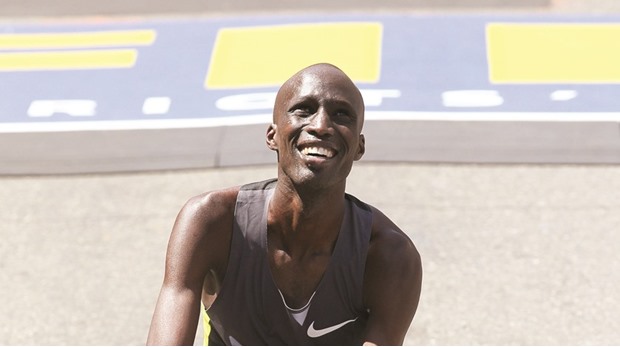When Wesley Korir and the rest of the Kenyan men’s marathon team line up in the Sambadrome in Rio tomorrow, the prayers of millions across their homeland will go with them.
Few will be as fervent as those delivered by the many congregations in Iten, a small town perched on a spectacular escarpment above the Great Rift Valley.
“They are heroes to us all. We are all with them in our minds when they run,” said Moses Koech, a hotel worker.
Korir has a home in Iten and, like almost all Kenyan runners, is from a dirt poor background. The 33-year-old grew up on a tiny farm, running miles to and from school every day—as did Eliud Kipchoge, who won the London Marathon in April for the second consecutive year, and Stanley Biwott, who will both be competing alongside him.
But even among Kenyan long distance runners, Korir’s biography stands out. Not only is he the winner of several top races around the world and now a dollar millionaire, but he is also a serving member of parliament, having been elected in 2012 from a constituency in the far west of the country, near the city of Eldoret and his home village.
Plunged into the harsh world of Kenyan politics, Korir has had to split his Olympic preparation between the slopes and trails of the Rift Valley, a forest outside the capital Nairobi, and a gym in the National Assembly.
Officials had to install a new running machine as the top speed of the one in place was too slow for the new representative. “I got involved in politics to change things. I’m now trying to make sure politics doesn’t change me,” Korir told the Guardian in an interview in June.
Korir, who is married to Canadian athlete Tarah McKay, began running after high school. By 2004 his talent had won him a scholarship to the US, where he worked as a maintenance man to support himself.
In 2008, on a visit home to Kenya, Korir was caught up in ethnic violence after disputed elections. He has described seeing killings —
including the murder of a well-known local athlete—and houses burned to the ground by mobs before he escaped to neighbouring Uganda.
Within months, Korir entered his first marathon, in Chicago. In 2009, he won in Los Angeles. Three years later, he invested his winnings from the Boston Marathon in an election campaign in his homeland, standing as an independent.
But in Kenya patronage, power, politics, cash and ethnicity combine to form a sometimes heady brew. Politicians, particularly the rare independents, need to find funds for development projects in their constituencies themselves.
Korir also finances his own foundation which pays school fees for 300 children, supports 2,000 farmers and provides hundreds of jobs. Such largesse is expected from successful runners in Kenya, but especially the only one who has an elected office.
“I have a choice: keep running or be corrupt, so I keep running. Athletes in the west have another job, or a fall-back. I don’t. People ask why do Kenyans run so fast, and the answer is they are running away from poverty,” he says.
No longer poor himself, Korir’s Twitter feed describes his eventual ambition: to be president of Kenya. The Olympics could be a launchpad. “I go to my constituency now and see the enthusiasm and goodwill. I’m campaigning for re-election next year and the Olympics will give me a launchpad financially and generate excitement. The country will be watching,” Korir said.
There are other more immediate goals tomorrow. Korir has passed the last few months training on the high plateau — about 7,000ft up —
around Eldoret with teammate Kipchoge, who is the favourite to win tomorrow’s race in Rio.
Korir has been a vocal critic of doping in distance running. International athletics officials have said that the use of performance enhancing drugs is widespread among Kenyan sportspeople. This, he says, pains him.
“We are not going to the Olympics to win medals. That will be a bonus. We are there to clear the name of Kenyan athletes. Spectators need to be able to watch a Kenyan run and be sure he is clean,” Korir said.
Observers have suggested many reasons for the problems with doping in Kenya: corruption, the incentive of six-figure earnings in a poor country and poor regulation.
But Korir says the problem is larger. “Fighting doping does not mean just passing a law. It is more than testing. We need to go back and see where we went wrong,” he says.
One problem was the focus of race directors and sponsors on ever-faster times, Kiror said. This tempts those with less talent into shortcuts to fame and fortune.
He suggests spectators too need to think differently. “It is not the times the athletes have run that are important. They (spectators) have to understand what a win means to him, to his family, to his country,” Kiror said.
“To those watching, a runner should not be a machine but a person whose success could change... the lives of hundreds or thousands of people... There are lots of theories about why Kenyan runners are so good. The answer is simple: they are running to change lives.”

Wesley Korir
